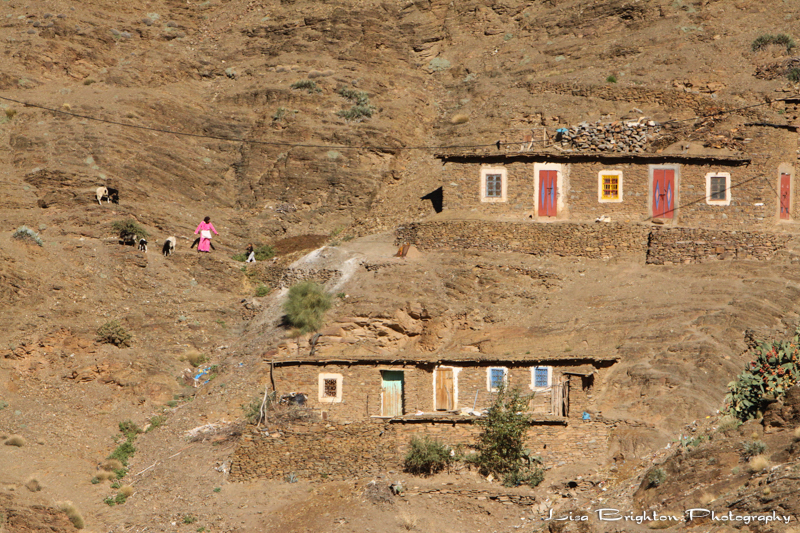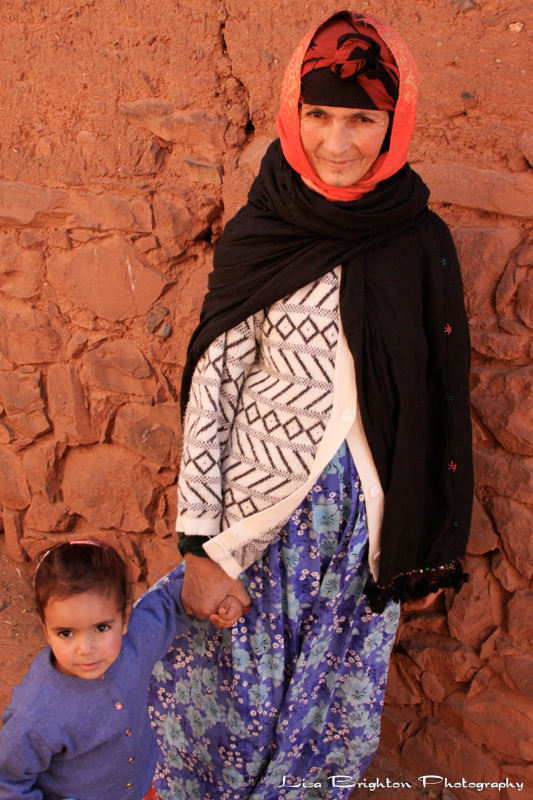3. Community
 OK, I’m not looking over the edge, not looking… still not looking… Just look out, not down… Wait… What am I thinking? In this fog, I can’t see down anyway… “Anyone feeling motion sick?” someone asks. “If you do, you should be sitting up front.” I watch as one of the women in my group moves from somewhere behind me to a bus seat a few rows in front of me. This morning’s drive in the fog with hairpin turns through the Atlas Mountains is proving to be a challenge — even for our driver. We are about an hour in before the fog starts to lift and we can see the dramatic scenery around us. The blue sky that’s breaking through is like a giant welcome sign telling us to breathe a little easier now that we can see our view — and what a view! Rolling, rocky mountains blanket the landscape and act as a camouflage. If it weren’t for the colorful front doors and window frames, I wouldn’t be able to differentiate between the earth and the monochromatic houses. Then I see some movement… Across the gorge there is a woman in bright pink clothing with a small group of goats on the mountainside. It looks like she’s trying to manage them and a small child at the same time. It also looks like it’s a lot of work given the angle of the hillside they’re on, but I’m guessing that feeding the goats is part of her morning routine. Our bus stops for a few moments so we can capture some images of the scenery. While doing so, I can’t help but think that this journey is anything but routine for me. It is invigorating to see such a different way of life and how the people have adapted to their environments. It feels especially invigorating later in the day when we leave the bus again to visit the Berber village of Ighrem N’Ougdal. Two Peace Corps volunteers greet us. Alexa and Angelina lead a tour through the very small community, which is isolated on a hillside. We have to hike up and through the village to get to a family’s home. They welcome us with hot mint tea and freshly baked sweets. It’s nice to be in their home to see and hear how their lifestyle is rooted in traditions from long, long ago. “At one time,” Mohammed says, “if you stole apples from your neighbor’s harvest, you would be exiled from the village until the next season, or perhaps punished by being sentenced to work their harvest the next year.” I think of my grandmother, who was an apple farmer, and how many times she probably had apples stolen from her farm. She would have appreciated that punishment… “When you are finished with your refreshments, you can walk around the village,” Mohammed says. “This is a very quiet and peaceful community, so please be mindful of that while taking your pictures.” I thank our hosts for their hospitality, get my gear, and start to walk through the village with Alexa. She tells me what it’s like volunteering with the Peace Corps as I take images of people going about their daily lives. I notice that, just like on the hillside highway, all of the structures are made from blocks of stone, in either a neutral
OK, I’m not looking over the edge, not looking… still not looking… Just look out, not down… Wait… What am I thinking? In this fog, I can’t see down anyway… “Anyone feeling motion sick?” someone asks. “If you do, you should be sitting up front.” I watch as one of the women in my group moves from somewhere behind me to a bus seat a few rows in front of me. This morning’s drive in the fog with hairpin turns through the Atlas Mountains is proving to be a challenge — even for our driver. We are about an hour in before the fog starts to lift and we can see the dramatic scenery around us. The blue sky that’s breaking through is like a giant welcome sign telling us to breathe a little easier now that we can see our view — and what a view! Rolling, rocky mountains blanket the landscape and act as a camouflage. If it weren’t for the colorful front doors and window frames, I wouldn’t be able to differentiate between the earth and the monochromatic houses. Then I see some movement… Across the gorge there is a woman in bright pink clothing with a small group of goats on the mountainside. It looks like she’s trying to manage them and a small child at the same time. It also looks like it’s a lot of work given the angle of the hillside they’re on, but I’m guessing that feeding the goats is part of her morning routine. Our bus stops for a few moments so we can capture some images of the scenery. While doing so, I can’t help but think that this journey is anything but routine for me. It is invigorating to see such a different way of life and how the people have adapted to their environments. It feels especially invigorating later in the day when we leave the bus again to visit the Berber village of Ighrem N’Ougdal. Two Peace Corps volunteers greet us. Alexa and Angelina lead a tour through the very small community, which is isolated on a hillside. We have to hike up and through the village to get to a family’s home. They welcome us with hot mint tea and freshly baked sweets. It’s nice to be in their home to see and hear how their lifestyle is rooted in traditions from long, long ago. “At one time,” Mohammed says, “if you stole apples from your neighbor’s harvest, you would be exiled from the village until the next season, or perhaps punished by being sentenced to work their harvest the next year.” I think of my grandmother, who was an apple farmer, and how many times she probably had apples stolen from her farm. She would have appreciated that punishment… “When you are finished with your refreshments, you can walk around the village,” Mohammed says. “This is a very quiet and peaceful community, so please be mindful of that while taking your pictures.” I thank our hosts for their hospitality, get my gear, and start to walk through the village with Alexa. She tells me what it’s like volunteering with the Peace Corps as I take images of people going about their daily lives. I notice that, just like on the hillside highway, all of the structures are made from blocks of stone, in either a neutral  gray or rusty orange color. They aren’t mixed, so it’s difficult to tell where one building ends and another begins. If it weren’t for the voices of children that suddenly get my attention, I wouldn’t have known that I was walking past a school. “Do you want to go in?” Alexa asks. “I’d love to.” She leads the way, and the next thing I know, we are standing in front of a classroom of young students of various ages. I listen to Alexa speaking to them in their local language, Tashleheet. My mind starts racing. How am I going to communicate with them? I quickly realize that I can’t, except through Alexa as an interpreter, or non-verbally. I look at the children, and they look at me. Alexa says, “Why don’t you tell them a little bit about where you are from?” I start to speak about Michigan as she translates. I see one little boy eyeing me with a funny look on his face. He stares, looks at Alexa, and then glances back at me. His big brown eyes are wide open, and his innocent curiosity makes me smile. Suddenly, a little girl interrupts me and blurts out, “I’m eleven and she’s twelve.” Then a boy blurts out his age, showing me on his fingers as he counts to eight. Their eagerness to communicate in English is touching, and I wish we had more time with them. But we have to go. We leave the school, but my mind is spinning with a million questions about this small village. I think about how sheltered their lives are from some of the modern world’s harsh realities. I feel fortunate to have visited this Berber community, although my stay was brief. Their sense of community is evident, and that’s something that so much of the world desperately needs.
gray or rusty orange color. They aren’t mixed, so it’s difficult to tell where one building ends and another begins. If it weren’t for the voices of children that suddenly get my attention, I wouldn’t have known that I was walking past a school. “Do you want to go in?” Alexa asks. “I’d love to.” She leads the way, and the next thing I know, we are standing in front of a classroom of young students of various ages. I listen to Alexa speaking to them in their local language, Tashleheet. My mind starts racing. How am I going to communicate with them? I quickly realize that I can’t, except through Alexa as an interpreter, or non-verbally. I look at the children, and they look at me. Alexa says, “Why don’t you tell them a little bit about where you are from?” I start to speak about Michigan as she translates. I see one little boy eyeing me with a funny look on his face. He stares, looks at Alexa, and then glances back at me. His big brown eyes are wide open, and his innocent curiosity makes me smile. Suddenly, a little girl interrupts me and blurts out, “I’m eleven and she’s twelve.” Then a boy blurts out his age, showing me on his fingers as he counts to eight. Their eagerness to communicate in English is touching, and I wish we had more time with them. But we have to go. We leave the school, but my mind is spinning with a million questions about this small village. I think about how sheltered their lives are from some of the modern world’s harsh realities. I feel fortunate to have visited this Berber community, although my stay was brief. Their sense of community is evident, and that’s something that so much of the world desperately needs.
